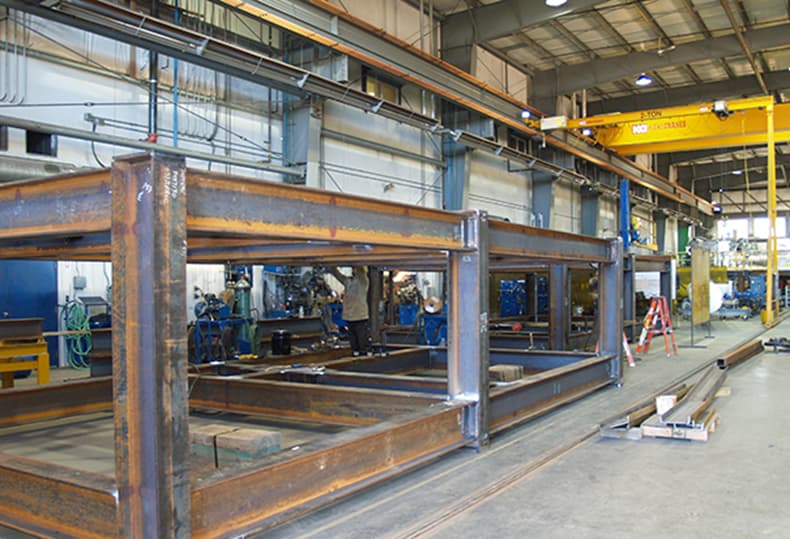The Ultimate Manual on Custom Steel Manufacture Solutions for Structural Projects
In the world of structural projects, the relevance of custom-made steel construction remedies can not be overstated. From the fundamental understanding of steel construction fundamentals to the elaborate process of selecting the most suitable materials, every step in this trip plays a critical duty in the utmost success of a project.
Comprehending Custom-made Steel Manufacture Fundamentals
Diving right into the fundamentals of custom steel fabrication gives understanding right into the intricate process of transforming raw steel into customized structural parts. Personalized steel fabrication is a specialized production technique that involves cutting, shaping, and putting together steel products to create unique structures according to particular job requirements. Comprehending the basics of personalized steel manufacture is important for making certain the successful execution of architectural projects.
The process usually starts with the evaluation of project specifications and style needs. This initial phase entails detailed preparation and cooperation in between developers, makers, and designers to establish one of the most ideal approach for making the steel elements. Accuracy is essential during the manufacture procedure, as even small variances can influence the structural honesty of the final product.
Various strategies, such as reducing, welding, and shaping, are utilized to transform raw steel into the desired architectural components. Proficient fabricators utilize sophisticated machinery and tools to make certain precision and uniformity throughout the manufacture process. Quality assurance procedures are implemented to verify the stability of the made components before they are assembled on-site, making certain conformity with market requirements and job requirements.
Choosing the Right Steel Products

Firstly, the kind of structural job and its certain requirements play a vital function in figuring out one of the most suitable steel products. Variables such as the load-bearing capacity, ecological problems, and desired life expectancy of the framework will determine the quality and type of steel that should be made use of.
Furthermore, the physical residential or commercial properties of the steel, including ductility, strength, and weldability, should straighten with the task's requirements to assure optimum efficiency and resilience (metal fabrication melbourne). In addition, factors to consider such as deterioration resistance, cost-effectiveness, and availability of the steel products ought to also be taken into account throughout the selection procedure
Design Considerations for Structural Tasks
Architectural tasks necessitate careful attention to design factors to consider to guarantee both capability and security are focused on throughout the building and construction process. When it comes to developing architectural jobs, several vital variables need to be taken right into account to guarantee the success of the venture. link By carefully thinking about these aspects during the style stage, engineers and designers can make certain the architectural job's success from conception to completion.
Enhancing Manufacture Processes for Performance

Additionally, carrying out lean production principles can significantly improve effectiveness in steel construction. By decreasing waste, enhancing workflow, and boosting interaction in between different groups associated with the construction process, projects can be finished much more quickly and with higher top quality requirements.
Moreover, establishing a well-organized production routine and process can help in focusing on tasks, designating sources efficiently, and meeting job target dates without delay. By having a clear strategy in position and regularly checking progress, any possible traffic jams or delays can be determined and addressed immediately, making sure efficient and smooth construction procedures for architectural jobs.
Quality Assurance and Project Administration in Steel Fabrication
To guarantee the effective execution of steel manufacture tasks, meticulous quality assurance procedures and go to this web-site efficient task administration techniques are vital elements in maintaining precision and meeting customer assumptions. Quality control in steel construction involves extensive inspections at numerous stages of the manufacture procedure to verify conformity with task specifications and market standards. This includes material testing, dimensional checks, and weld examinations to guarantee structural honesty and security.
Task administration plays a vital duty in working with the different aspects of steel fabrication tasks, such as organizing, source allocation, and communication amongst staff member. A distinct project plan with clear objectives, landmarks, and timelines helps to keep track of progression and deal with any kind of potential issues proactively. Reliable interaction in between all stakeholders, including customers, producers, professionals, and engineers, is crucial for making sure that the task advances efficiently and meets the wanted top quality requirements.
Conclusion
Finally, custom steel construction plays an important function in structural jobs by supplying tailored services making use of the ideal materials and style factors to consider. Effectiveness in fabrication procedures, quality assurance, and reliable job management are crucial for effective results. By recognizing the basics of personalized steel fabrication and executing streamlined processes, task groups can provide durable and premium frameworks that fulfill the certain needs of their customers.
Custom steel construction is a customized manufacturing method that entails cutting, shaping, and assembling steel products to create special frameworks according to particular task needs.To ensure the effective execution of steel fabrication projects, careful top quality control steps and efficient project monitoring techniques are essential elements in keeping precision and conference customer assumptions. Quality control in steel manufacture involves rigorous assessments at various stages of the fabrication process to confirm conformity with task specifications and sector criteria (metal fabrication melbourne).Task management plays a critical duty in coordinating the various elements of steel fabrication tasks, such as organizing, resource allocation, and interaction amongst group participants.In verdict, custom-made steel fabrication plays a vital function in architectural projects by giving tailored solutions utilizing the best products and style factors to consider